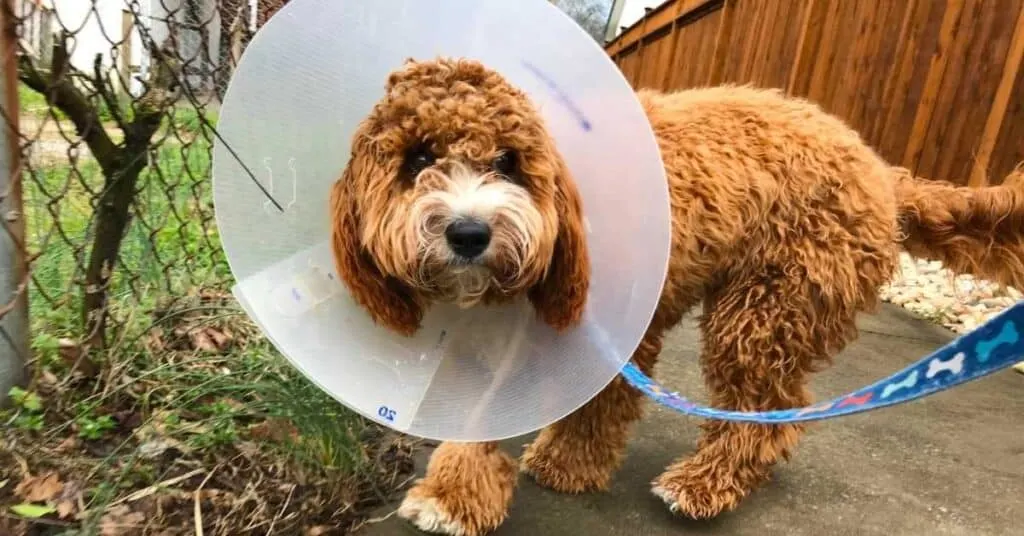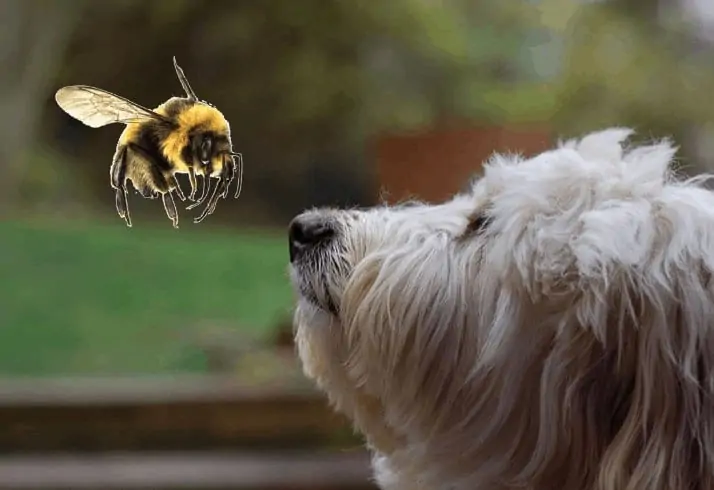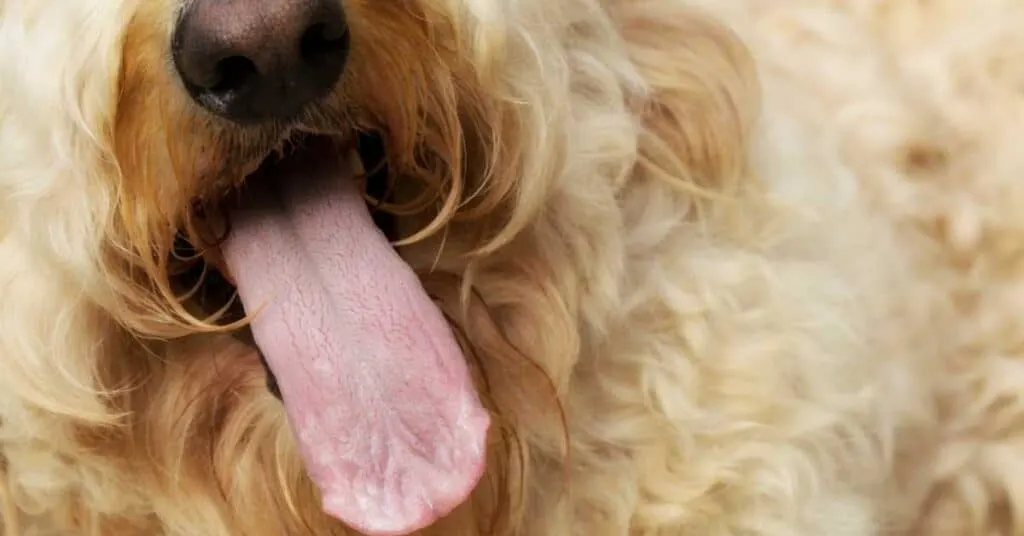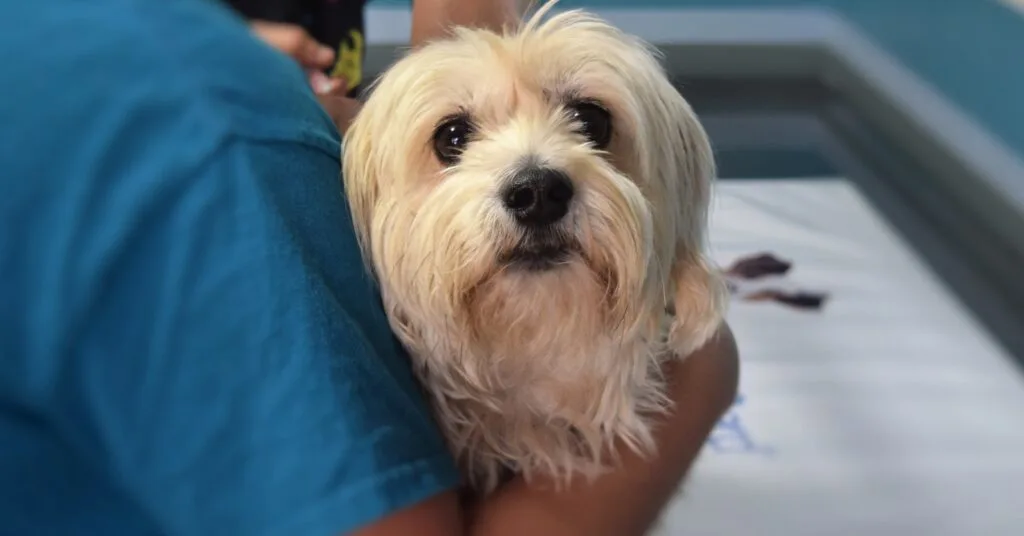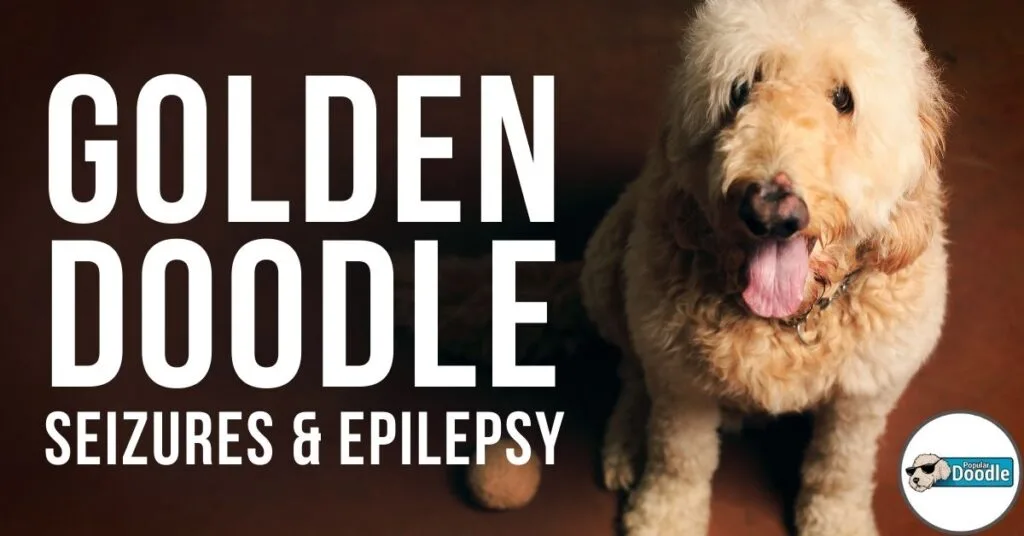By Dr. Merliza Cabriles, D.V.M.
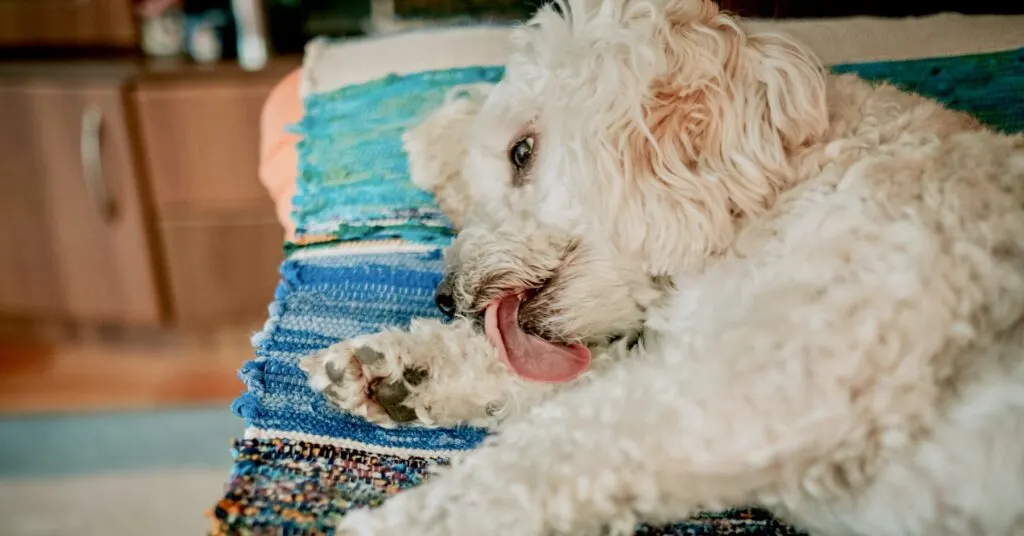
Excessive paw licking in Goldendoodles can cause the skin to become raw and irritated. In addition, Goldendoodle paw licking can pave the way for secondary fungal or bacterial infections and other problems to develop.
While it’s normal for dogs to groom and lick themselves, obsessively licking their paws should be a cause for concern.
In this article, I’ll explain why your dog engages in this behavior. You’ll also learn how you can help them put an end to it and when you should consider getting your veterinarian or another professional involved.
Why Do Goldendoodles Lick Their Paws?
Paw licking is a behavior that comes naturally for Goldendoodles and other dogs. They do it for self-grooming.
While not as meticulous as cats when it comes to grooming, dogs regularly lick their paws, tail, and other parts of their body to remove any dirt or debris.
However, when paw licking becomes an obsession, your Goldendoodle’s behavior warrants a closer look. There are several reasons why your pet engages in excessive paw licking.
This undesirable behavior could be caused by allergies, boredom, anxiety, pain in the foot, infection, and other issues that affect the paws and associated structures.
Identifying the underlying cause is very important in eliminating the behavior.
Causes of Excessive Goldendoodle Paw Licking
Identifying the underlying cause of your pet’s obsessive paw licking is the first step in addressing the problem. Once you determine the reason, you and your veterinarian can take appropriate intervention measures.
There are several reasons for excessive paw licking in Goldendoodles. The top reasons include the following:
Allergies
Allergens in your Goldendoodle’s diet or environment can trigger hypersensitive reactions. For example, it may be an ingredient in their pet food, chemicals in the house or lawn, grass, medicine, pollen, etc.
Identifying the allergen culprit may take some time and careful monitoring. Knowing what’s triggering your dog’s allergies can help you find ways to reduce or altogether avoid your Goldendoodle’s exposure to the allergen.
A visit to your veterinarian is also helpful for pinpointing the cause of your pet’s allergies.
Behavioral or Emotional Issues
Boredom, phobias, depression, and anxiety are potent fuels for developing problem behaviors like Goldendoodle paw licking. A Goldendoodle lacking physical and mental stimulation can become bored and look for ways to amuse themselves, such as licking their paws to pass the time away.
Some dogs are also more predisposed to separation anxiety and obsessive-compulsive disorders. In these situations, they lick their paws to seek relief from stress and boredom.
Pain
Any number of things, including bee stings, insect bites, foreign objects, or broken or overgrown nails, can cause pain in your Goldendoodle’s paws. Licking may be a stress reaction to this pain or an attempt to soothe their discomfort.
If you can’t see anything wrong when you examine your pet’s paws closely, you should not ignore the constant paw licking and chewing. A more serious cause, such as a fracture or a muscle sprain, could be why your Goldendoodle is licking their paws excessively.
Fleas, Ticks, Lice, or Mites
The bites of these parasites are often itchy, which can lead to obsessive paw licking and chewing.
The problem is more serious in pets that are allergic to flea bites. Even a bite or two can be very itchy for these hypersensitive pets.
When external parasites are behind your Goldendoodle’s obsessive paw licking, excessive scratching usually includes other parts of the body as well.
Hormonal Imbalance and Other Health Issues
Skin itching may be a symptom of certain endocrine problems, such as hypothyroidism (low thyroid hormone) or Cushing’s disease (too much cortisol).
Nutritional deficiencies, kidney disease, and other health issues have also been identified as potential underlying causes of Goldendoodles licking their paws.
Related: Goldendoodle Health Issues: 10 Common Goldendoodle Health Problems to Look Out For!
De-icing Salts and Ice Balls
When you take your Goldendoodle for a walk during the winter, they may step on de-icing salts on roads and driveways. These are chemicals that are applied to melt ice during winter. Unfortunately, de-icing salts can cause chemical burns on your pet’s paws.
Avoiding areas where these salts are heavily applied is the best option. When that’s not practical, booties or protective creams like Musher’s Secret Paw Wax can help create a barrier against these harsh chemicals.
Also, even a short walk around the block during winter can cause ice balls to form between your Goldendoodle’s furry toes. Ice balls can cause the skin to crack and bleed.
A great way to get rid of ice balls between your Goldendoodle’s paw pads is by using the Dexus MudBuster. Simply fill it with lukewarm water and dip your dog’s paws in and out a few times before toweling them off.
Alternatively, gently running a kitchen whisk over your dog’s paws and legs is another trick to try.
Dry Skin
Dry skin can become very itchy and cause your Goldendoodle to lick and chew at their paws to find relief.
Burns
Your Goldendoodle’s paw pads may appear tough, but they can easily get burned when your dog walks on hot pavement.
The blisters and peeling will be very painful and uncomfortable for your pet. They are also ideal for infection to set in.
Remember that pavement temperatures can be much higher than air temperatures. Before walking your dog in the summer, test the pavement temperature by keeping your hand on a sunny part of the asphalt for 10 seconds. If it’s uncomfortable for you to do so, it could be dangerous for your dog.
Infections
When paw licking gets out of hand, it can become a deeply ingrained habit that can be difficult to eliminate. A Goldendoodle licking paws excessively can end up with stains on their fur.
Moisture from excessive licking can become trapped between your pet’s paws, creating a favorable environment for bacterial or fungal infections.
When excessive licking leads to inflammation and infection, it can eventually bring on a vicious cycle of itching, chewing, inflammation, and infection. As the infection worsens, so does your dog’s licking and chewing.
If there’s a wound, it may continue to fester when your dog’s licking introduces more bacteria into the area. Frequent licking and chewing can also significantly impair the healing process.
How to Get Your Goldendoodle to Stop Licking Their Paws (Potential Remedies)
Considering that not all Goldendoodle paw licking is caused by a medical issue, there are simple measures you can take at home to curb the undesirable habit.
- Provide adequate opportunities for your Goldendoodle’s physical and mental stimulation. Create an enriching environment where your dog can be encouraged to engage in natural behaviors. Enrichment games and regular interaction are also very important. These will keep your dog busy and away from undesirable habits.
- If a Goldendoodle licking paws is brought about by specific behavioral issues, such as noise phobia or separation anxiety, reducing your pet’s exposure to identified stressors, desensitization, and the use of pheromones and calming treats can also be a big help in addressing the behavior problem.
- If you notice your pet starting to lick or chew their paws, redirect their attention by offering a favorite chew toy or treat. You can also take your pet on walks or play with them more often.
- Physical deterrents, such as no-lick products or dog booties, can help prevent Goldendoodle paw licking. A bitter-tasting product that can be applied to your pet’s paws can also help discourage licking. However, before trying this, you want to ensure your Goldendoodle’s discomfort is not due to a health issue. Otherwise, you risk making them suffer without being able to relieve their discomfort.
- Have your pet wear dog booties while walking to protect your Goldendoodle’s paws from the extreme cold. Alternatively, you can apply paw wax to keep their paws well-moisturized.
- Choose a dog-safe product if you’re using de-icing salt for your driveway in winter. Additionally, make a habit of wiping your pet’s paws with a damp cloth or using a MudBuster after walks where de-icing salt may be present.
When to See a Professional About Your Goldendoodle’s Excessive Paw Licking, Biting, or Chewing
If the above-mentioned measures fail to stop your Goldendoodle’s paw licking, it’s time to make an appointment with your veterinarian.
Once the underlying cause has been identified, your veterinarian will recommend the best treatment to eliminate the behavior.
Have a question for a vet? Click here to live chat instantly with a verified veterinarian!
If parasite infestation is the culprit, appropriate anti-parasite medication will be recommended by your veterinarian. It’s also important to work with your veterinarian in creating a parasite preventive program that will give your Goldendoodle year-round protection against fleas, ticks, lice, mites, and other parasites.
Related: 10 Myths About Ticks on Dogs You Should Stop Believing
If it’s a food allergy, your veterinarian may recommend switching to another type of pet food that does not contain the offending allergen. Medications may also be given to alleviate itching and discomfort. Topical antibiotics may be necessary if there is a skin infection.
If a Goldendoodle licking paws continues, consider behavior modification techniques. Seek professional help from a dog behaviorist, trainer, or veterinary specialist.

Dr. Merliza Cabriles, D.V.M.
Contributing Professional
Dr. Merliza Cabriles is a licensed veterinarian and university professor with many years of experience in food animal and pet companion medicine. Her passion for writing as well as pet parent education and support is echoed in the articles and ebooks she has written.







